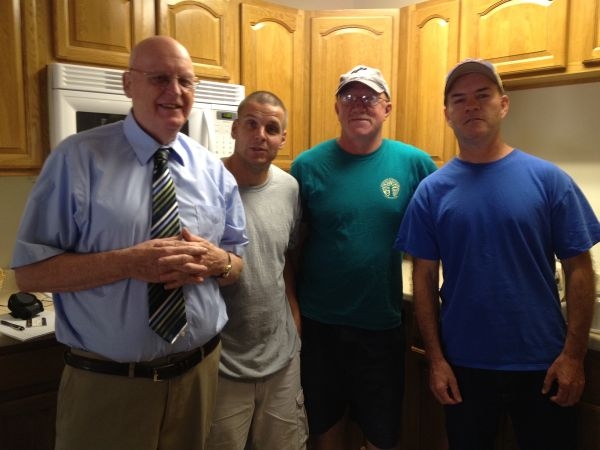
In Vermont, an estimated 125 veterans are homeless on any given night. And the Department of Veterans Affairs estimates that only one in ten veterans accesses available services.
But Vermont is slowly expanding its transitional housing for vets. Vermont now has four transitional residences for veterans, in Bradford, Rutland, Winooski, and Northfield.
The tidy white clapboard apartment building on Main Street in Bradford is occupied mainly by middle-aged vets from Vietnam and the first Gulf War who say they had to lose just about everything before being willing to accept help.
A washer/dryer drones in the apartment shared by Randy Sherman and James McCoy. After a two-month search, McCoy just got a job, washing dishes at a local drug and alcohol rehab center. He’s been trying to kick his own alcohol habit ever since he came back from the first Persian Gulf War, where he was in the Navy.
"Just anything related with alcoholism just worsened, so when I came back I had trouble holding jobs, and I had trouble with my relationships because alcohol got [me] in trouble and that was partially because of being in the war, and stuff," McCoy explained as he showed off his apartment.
McCoy credits some of his new-found sobriety to friendship with his roommate, Randy Sherman, who was an Army driver during a relatively peaceful time in the early 1980s. The athletic Sherman keeps McCoy running, biking, and doing push-ups. But Sherman suffers from chronic depression, and when his marriage failed and he lost his job he fled to his ice fishing shack in February.
"I was looking for a job and I was taking showers at a gym," Sherman recalled, "and then I found out about this place and from there everything’s going good."
In the kitchen, McCoy and Sherman swapped stories with another veteran, Jeff Rowe, who has struggled with alcoholism for years.
"Gradually, through bad choices, I had a good job and everything still, I got in a relationship with a woman who also had an alcohol problem and we both kind of went down and ended up homeless," Rowe said.
The ten men were referred to this program by the VA Hospital in White River Junction. Program manager Larry Seavey, a retired school administrator, is their mentor and, occasionally, a compassionate disciplinarian.
"I wanted a purpose and these guys give me all of the purpose I need," Seavey said. "And sometimes more than I need," he added, smiling at the men he’s in charge of.
He doesn’t admit anyone who doesn’t seem ready to get sober and hold down a job, and he has had to kick a few rule-breakers out of the house. But the ones who show improvement can stay as long as two years, for a program fee of no more than $150 per month.
Veterans Inc, the Massachusetts-based not-for-profit organization that runs this facility, recently got a million dollar renewal grant from the VA. One goal is to help 45 Vermonters who may be on the verge of homelessness. Outreach worker Dale Proulx was visiting the Bradford facility on the day we arrived.
"Some of our Vietnam era vets have struggled for decades," Proulx said, "and we don’t want to see the young veterans go through a similar process. The veterans that I work with from the Vietnam era would say to the young vets, get help early."
But the older vets who live here temporarily wonder how easy it will be to get younger soldiers just now coming home to admit they need help holding their lives together. It takes time to hit bottom, says former Navy man James McCoy. And some new vets, he fears, might not be there yet.